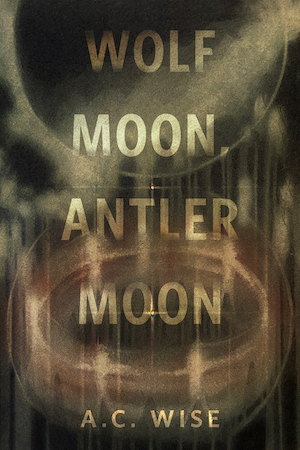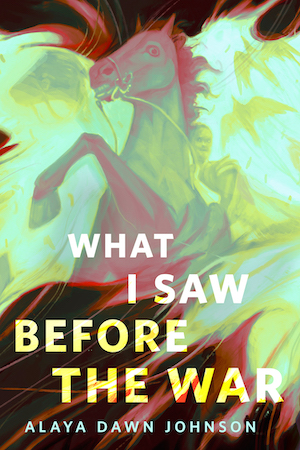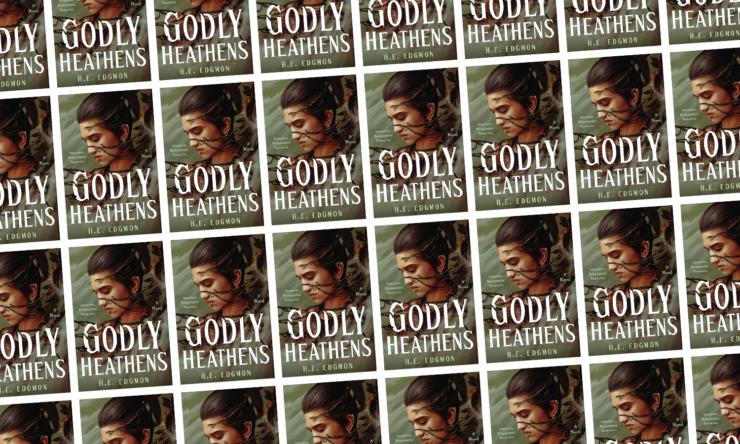Gem Echols has a problem. Several, actually. 1. They’re desperate to get out of their small Georgia town where they aren’t the only out queer person but they’re the most noticeable one. 2. Their mom is one of those “hate the sin, love the sinner” people when it comes to Gem being nonbinary. 3. Their best friend and kinda-sorta-boyfriend lives a thousand miles away. 4. A very cute trans person has just moved to town and is making Gem’s life equal parts miserable and sexy. 5. Apparently Gem is also an interdimensional god.
The story is a little complicated, but the short version is this: Thousands of years ago in a parallel universe, Gem teamed up with a monster to kill a bunch of their godly siblings, then, in a moment of regret, dragged everyone out of the old world and into a new one—our Earth. Now, every few generations, the gods reincarnate and hunt each other down. Some want to return, some want to stay, and everyone wants Gem’s god-killing blade. Gem isn’t sure what they want other than Rory, that cute newcomer, and Enzo, their big city boyfriend, and that they’ll do anything to keep them alive, even if it means unaliveing everyone else.
This is a tricky novel to review. So much of what I want to talk about would fall under spoiler territory, and half the fun is watching the reveal unfold in spectacularly chaotic fashion. I read a metric ton of young adult fantasy, so not much takes me by surprise anymore. Nevertheless, even when I could spot the twist coming, Edgmon took me on a wild ride.
Buy the Book


Godly Heathens
Gem is a tough nut to crack. I’m sure there are going to be a number of readers who will be frustrated with Gem as a character, but I love protagonists who are walking tornadoes of emotions and poor choices. Gem has never met a bad idea they didn’t try anyway, just because. Gem isn’t just a stereotypical YA novel reckless teen; they’re driven by need for attention and external validation. I can relate to that more than I’d like to admit. Like Gem, I made a lot of decisions as a teen I regret now as an adult, decisions that I didn’t realize at the time were largely because I didn’t understand who I was versus who everyone else wanted me to be. As they say over and over again, they aren’t only a god, they’re also Gem, a messed up, angry teenager from Nowheresville, Georgia.
The way Edgmon handles queerness and Indigeneity is really interesting as well. I was worried about the reincarnation aspect, because fantasy novels typically disregard race and gender. Characters change races, ethnicities, and genders as much as they do time periods and geographies. Instead of exploring the complexities and tensions in that sort of jumping around, it’s often used as a way to be colorblind when it comes to marginalized identities, to ignore systemic oppression and colonialism. Here, no matter when Gem and the other gods jump, certain traits carry through. While they aren’t always Native American—sometimes they’re Scottish, sometimes they’re Norse Vikings, etc—Gem and Rory are always a queer couple and Gem is always they/them. They’re typically part of an oppressed class while the other gods are often their oppressors. They’re rarely morally honorable heroes, but they’re always survivors.
Godly Heathens shares a lot of similarities with Edgmon’s other YA fantasy duology, The Witch King and The Fae Keeper. There’s a tough, angry trans teen with trauma issues who has more power than they realize and more responsibility than they want. Their parents are toxic, the people around them are slightly less toxic, their friends are quirky and queer, and their love interests are deadly and/or powerful. The protagonist’s people fled a portal world supposedly ruined in a great catastrophe and now may have to return or at least open the door between worlds. While the bones of the two series resemble each other, the stories are different enough to feel unique.
H.E. Edgmon’s Godly Heathens is an intense, passionate, frantic novel. It’s as sharp as a knife, as relentless as a runaway train, and as striking as a punch to the nose. It’s queer in both senses of the word: “queer” as in unconventional and eccentric and “queer” as in almost no one is cisallohet. In an interview, Edgmon described the book as “Terrible immortal children’s fight club,” which might be the most pithy yet accurate pitch since “lesbian necromancers in space” (i.e. Gideon the Ninth by Tamsyn Muir). Vibes-wise, if you loved The Scapegracers by H.A. Clarke or Legendborn by Tracy Deonn, Godly Heathens should be at the top of your TBR.
Godly Heathens is published by Wednesday Books.
Alex Brown is a Hugo-nominated and Ignyte award-winning critic who writes about speculative fiction, librarianship, and Black history. Find them on twitter (@QueenOfRats), bluesky (@bookjockeyalex), instagram (@bookjockeyalex), and their blog (bookjockeyalex.com).










